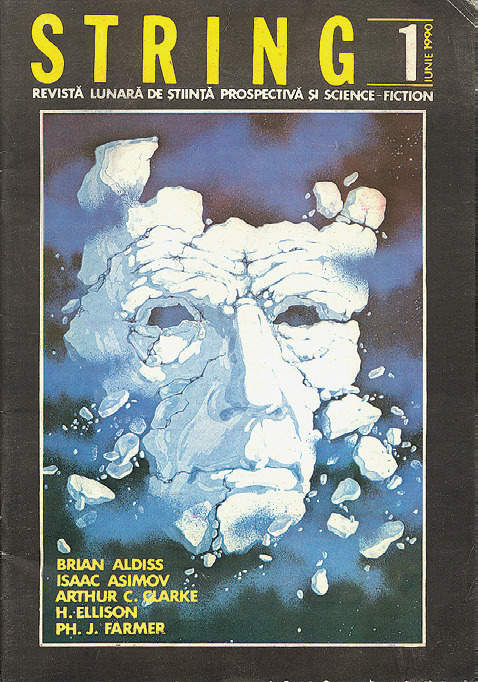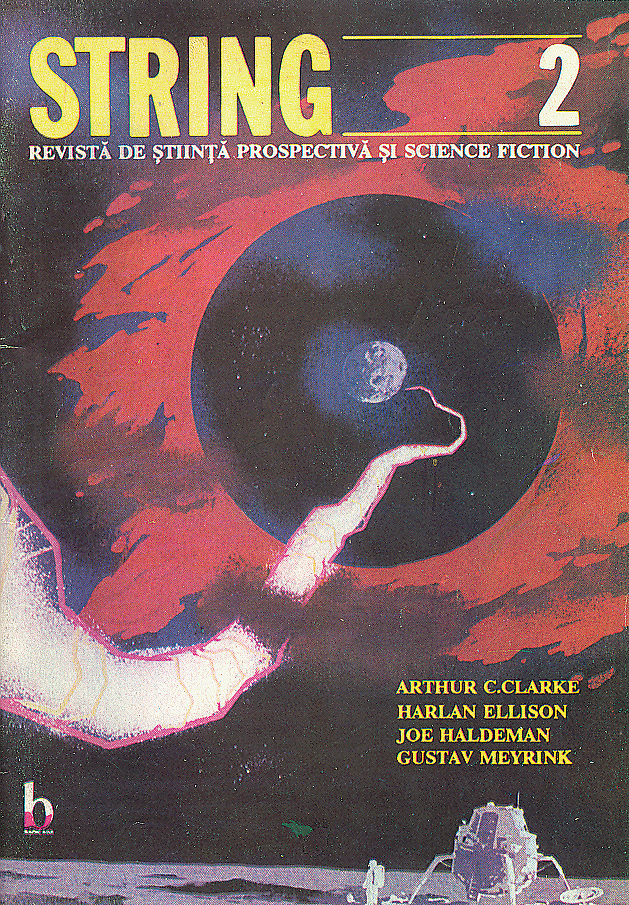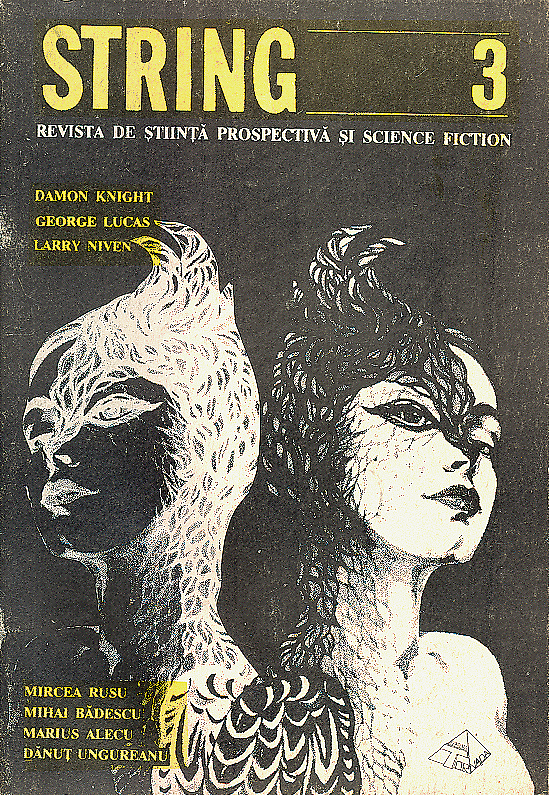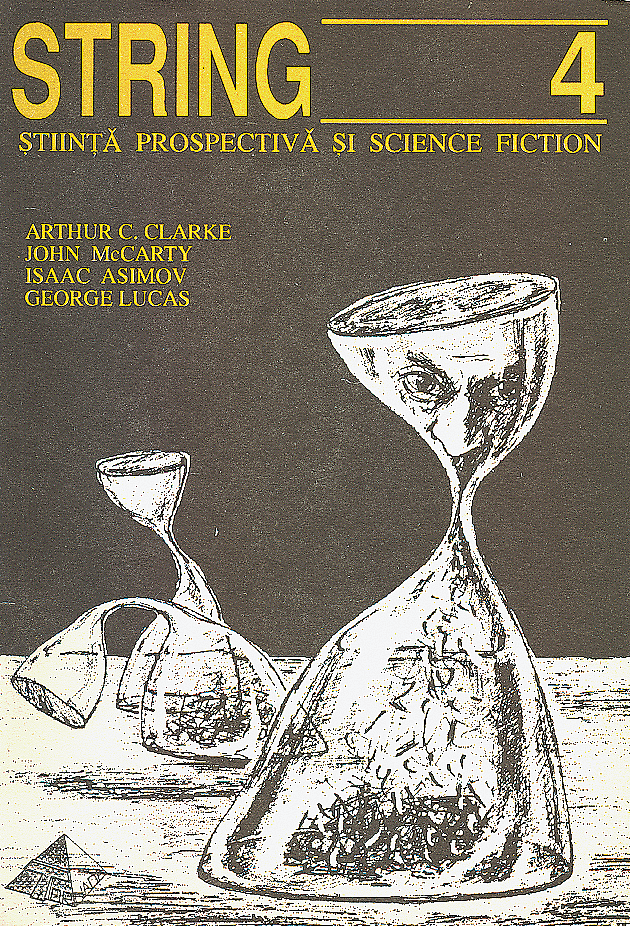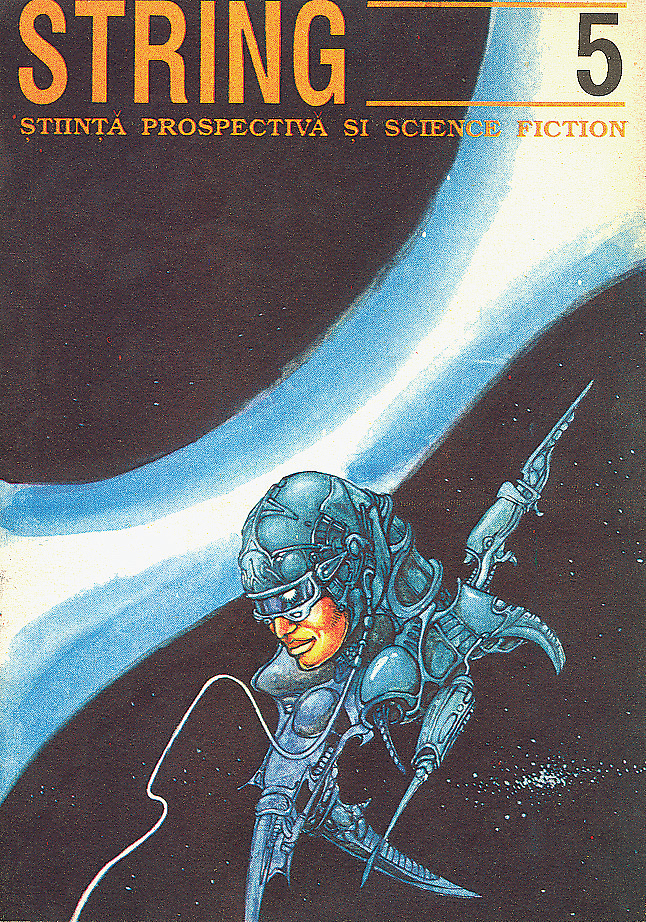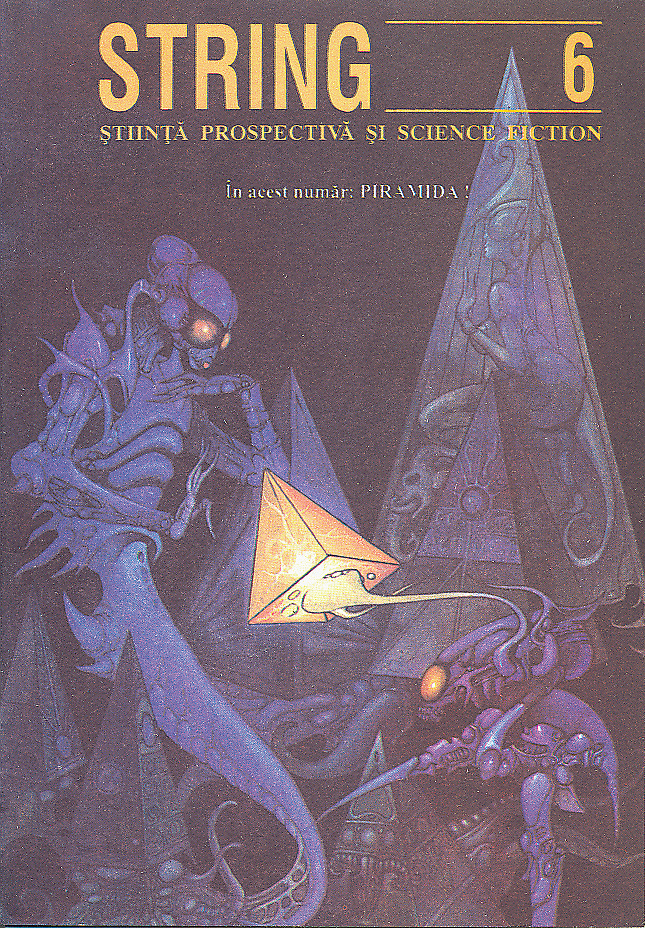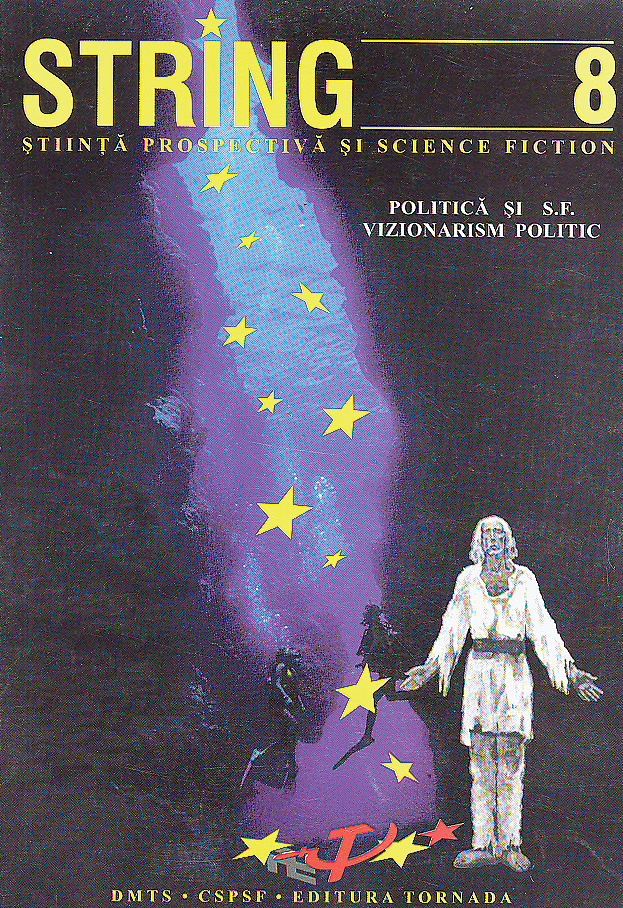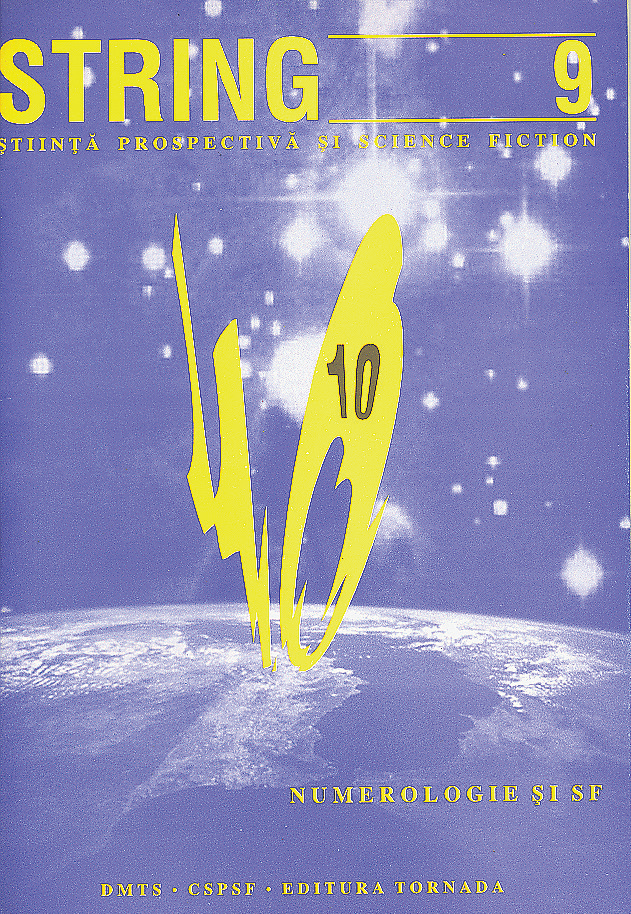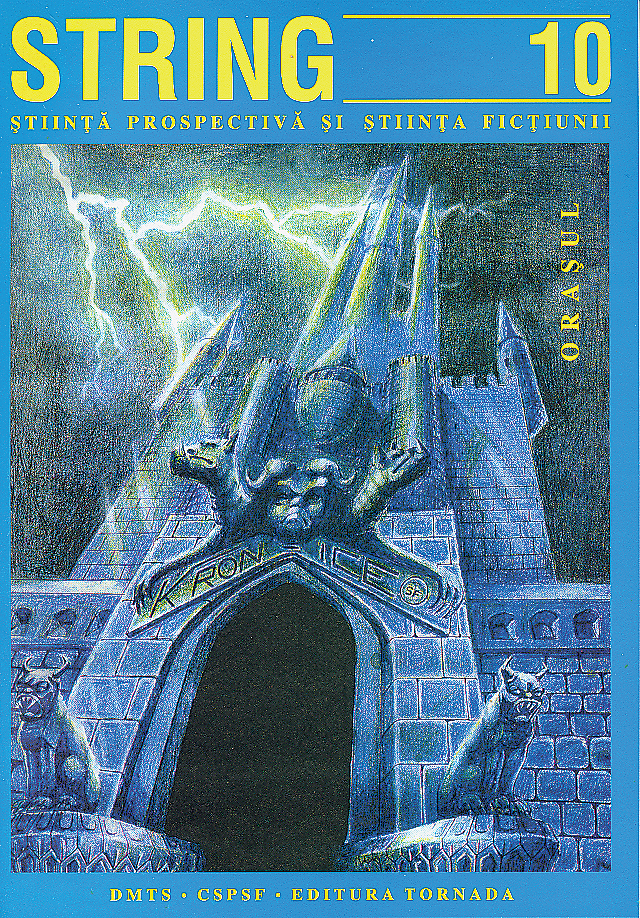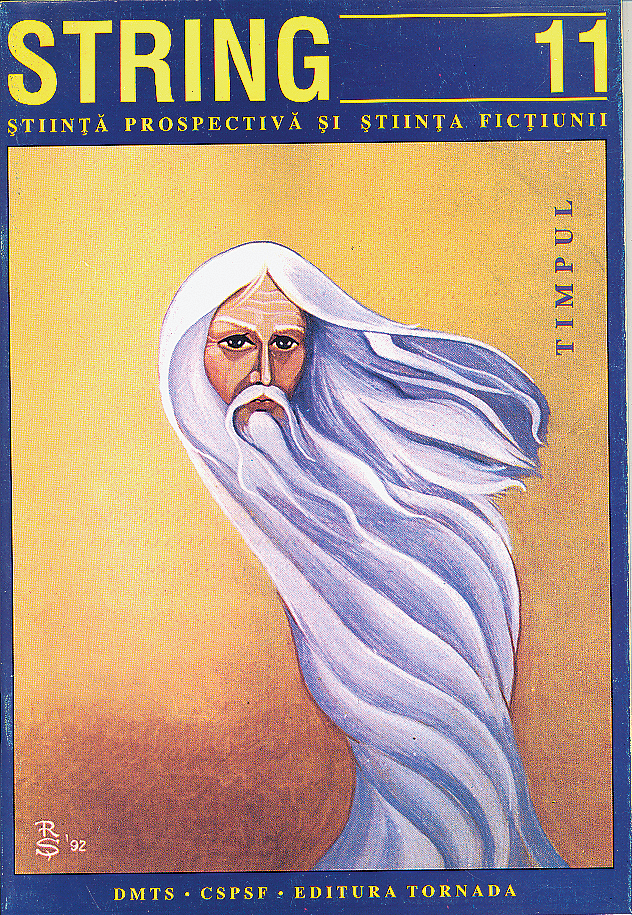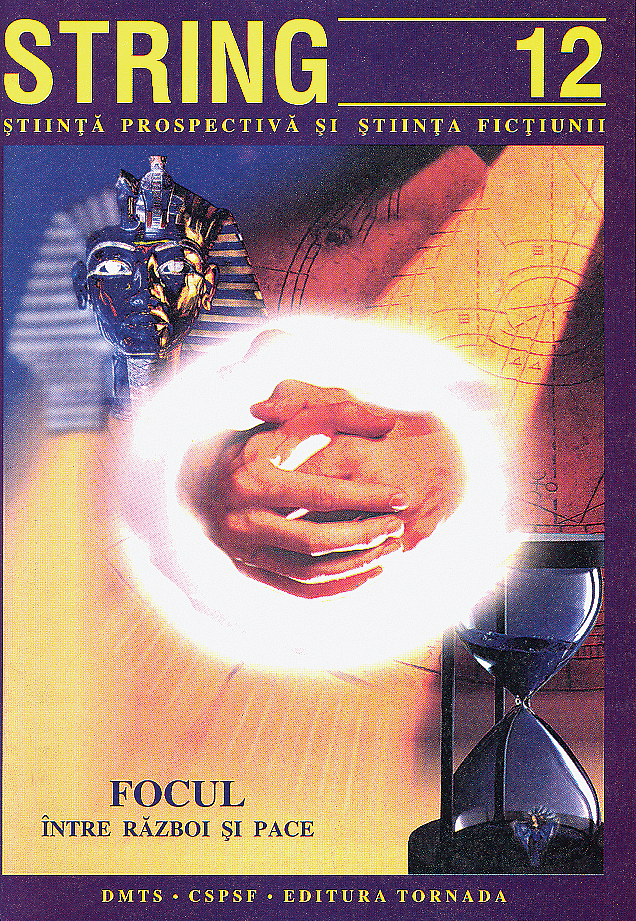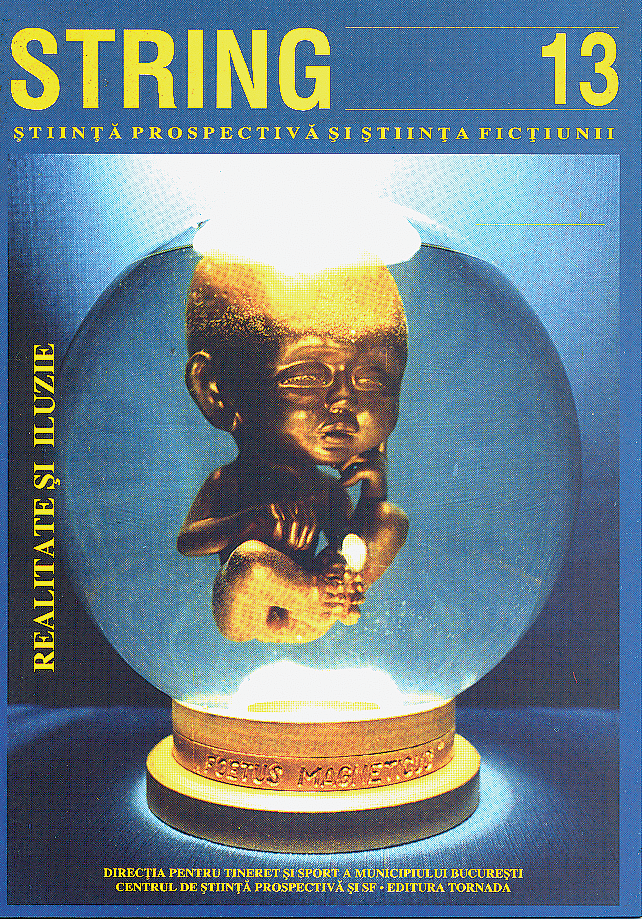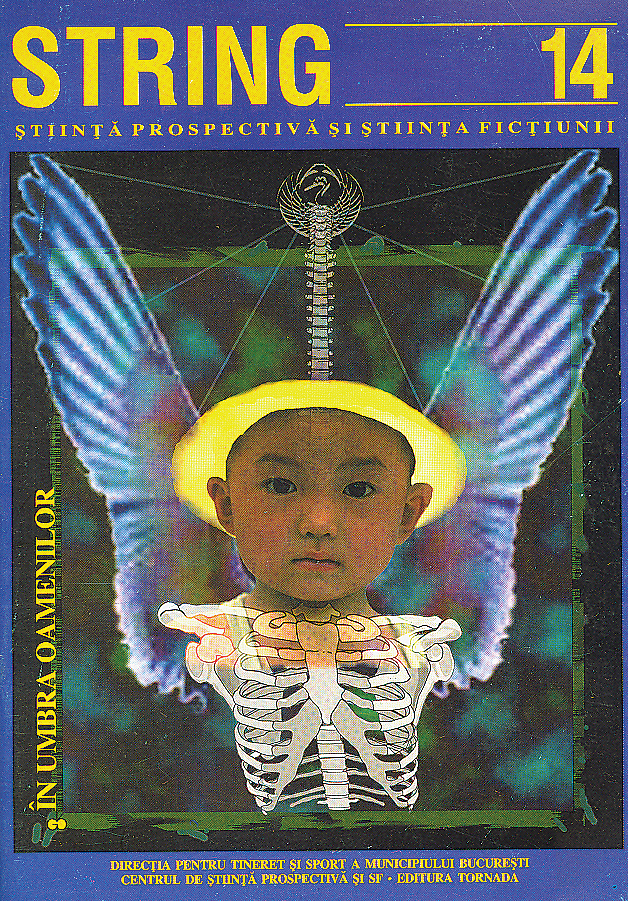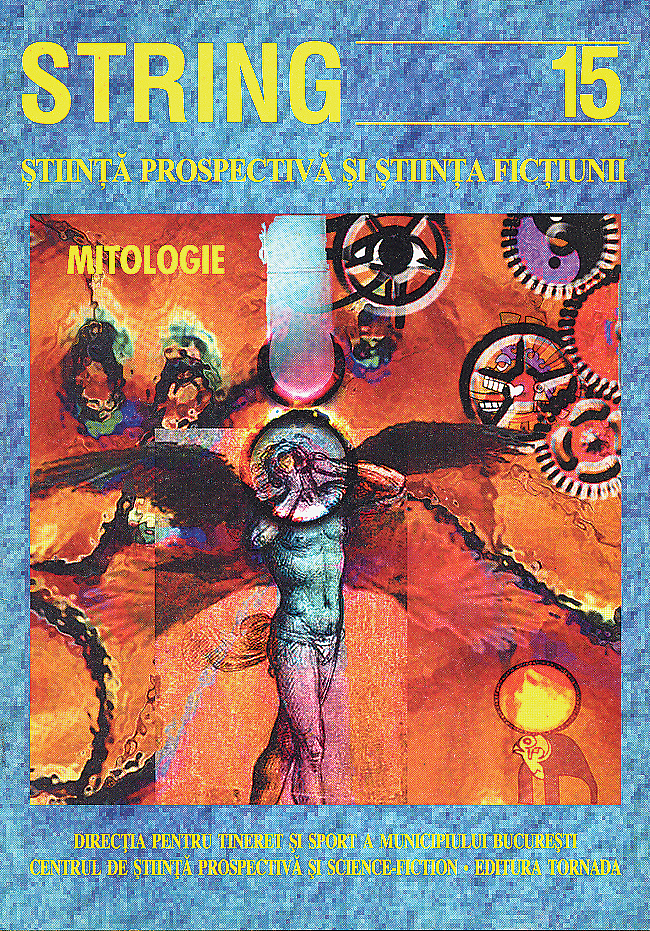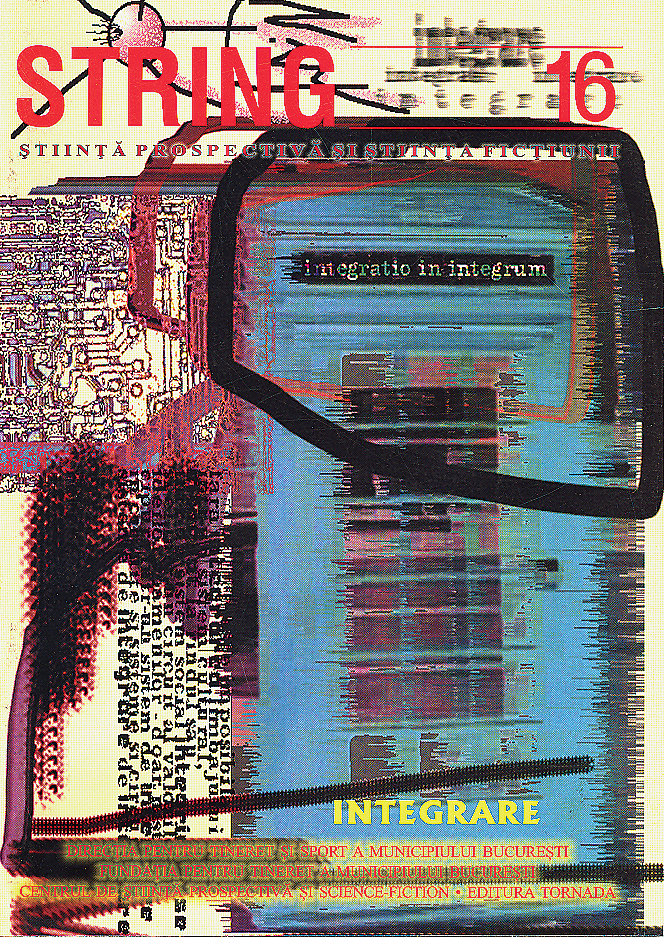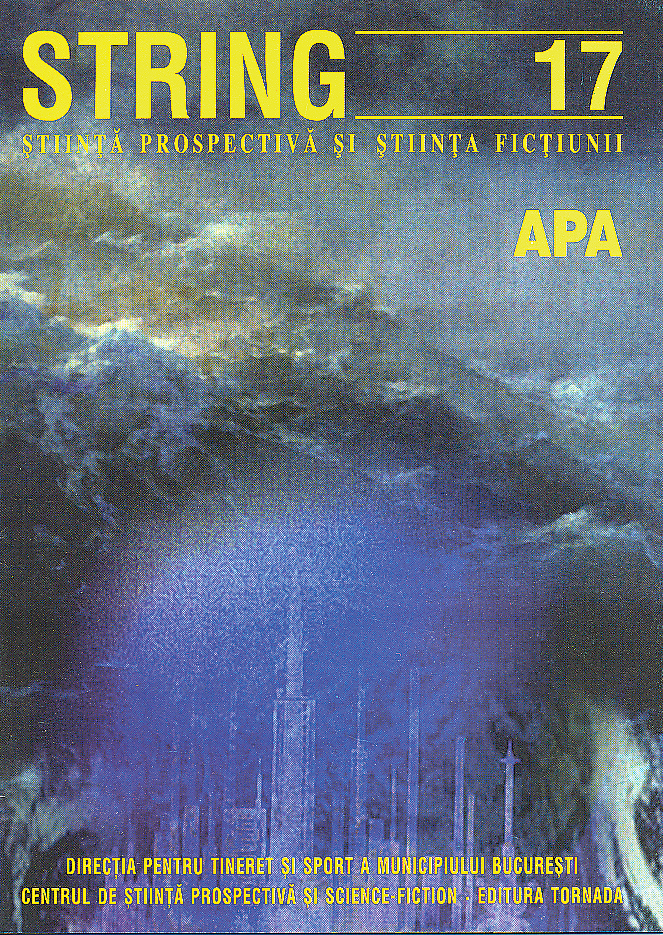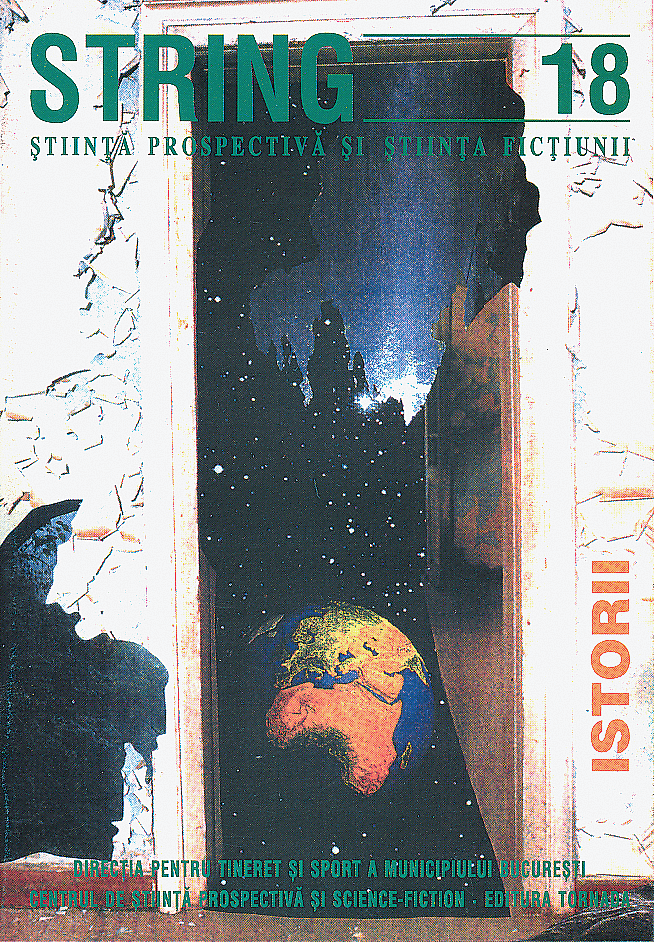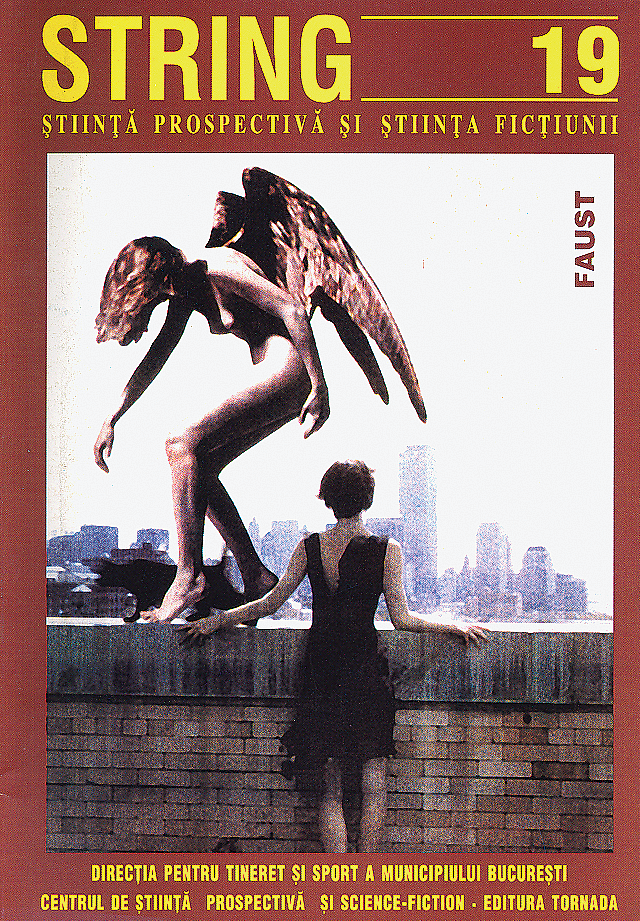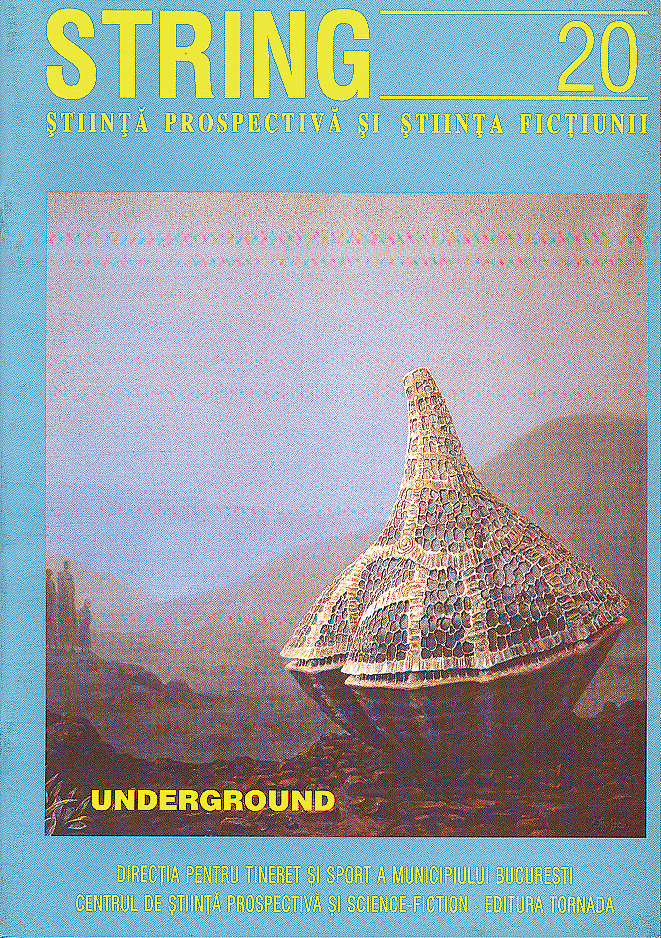String 7 magazine
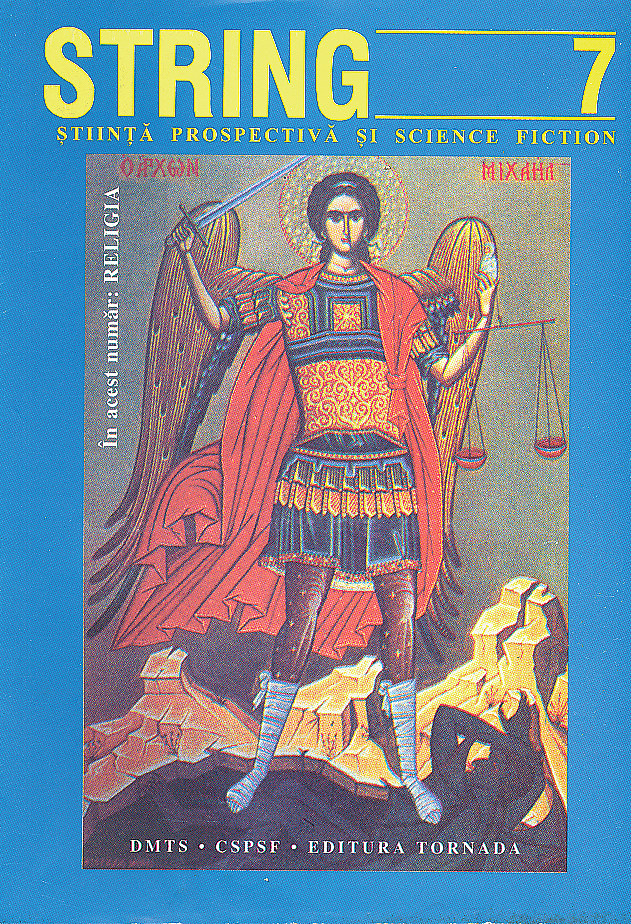
RELIGION AND S.F. – BLASPHEMY?
Discussing with a friend about the intention to make an issue of STRING magazine dedicated to religion and its relationship with SF, I provoked a reaction that I understood much later: that of indignation. How to put two such different notions together? A real blasphemy!
I realized that for most people (unfortunately, for many fans too) science fiction is a literary genre not marginal, but frivolous, incapable of dealing with substantive issues. An opinion due to both objective causes (many sci-fi productions are not, neither ideologically nor as a literary achievement, much above a childish level of perception of reality) as well as objective causes (lack of information, ignorance of representative works of sci-fi and above all the opinion that fundamental issues can only be treated in the mainstream).
Because of this, the desire to achieve this number became even stronger. It had become a matter of professional ethics. If we establish a proportion between the number of editorial appearances and the number of books that deal with the problems of divinity, of the relationship between man - society - divinity, we will surprisingly discover that the ratio is clearly favorable to S.F. Unfortunately, most readers treat border literature as entertainment literature. How many people read detective novels to do the social analysis of an era? Although some works (see Chandler, Hammet, Ross MacDonald) are deeper than many mainstream works. And if you want to learn something about metaphysics, read horror novels, not Nobel prize winners!
If, in a certain period, the vast majority of works S.F. were of a materialistic orientation (the statement is relative, because, for example, the novels of C.S. Lewis appeared in the 30s), lately, especially after the Dickian revolution, SF has become more and more concerned with the essence of things. It is no longer SF of another time, there is even talk of the death of SF. Because SF authors they made a great discovery: science does not mean only physics, electronics, medicine, chemistry or other technical sciences, but also sociology, political science, history, philosophy and theology.
On the other hand, the cultural level of SF authors and readers. grew enormously. References to important authors, the debate in the genre's own formulas of some fundamental themes of culture, have become commonplace. A fundamental question arose: what is the line between mainstream and S.F.? Why is Ernst Junger a mainstream writer, even though his major works ("On the Marble Cliffs," "The Glass Bees") can be found in any S.F. library? The same is true for Hermann Hesse, who received the Nobel Prize for "The Steppe Wolf" and "The Glass Bead Game"... In which category do we include Orwell? I think at this point the distance between mainstream and SF, so great a generation ago, is getting smaller and SF retains its individuality only because of certain literary devices of its own.
Concluding with the statement that there are no good or bad literary genres, only good or bad literature (regardless of genre), we will try to briefly analyze how SF literature. dealt with the problem of divinity.Let's define some concepts:
Faith. A human option that needs no real support. Mankind has, throughout time, believed in impossible things, and will continue to do so. There is no one-to-one relationship between faith and divinity. Divinity is beyond belief, regardless of it. Otherwise, it should be chameleon, if we take into account the variety of beliefs so far...
Divinity. She is, first and foremost, Creator. A deity who is not the author of the universe is useless. Other attributes of divinity: eternal, omnipotent, omniscient, has the gift of ubiquity. The question people ask is whether it exists or not, and if it does, how can I get in touch with it.
Religion. A set of dogmas, concepts and ideas, based on a certain perception of divinity.
Church. Organizational form for supporting a particular religion.
We find that there can be real or artificial connections between the four notions. A well-defined faith, religion or church with millions of believers may have nothing to do with divinity.
In fact, all of religious history is a desperate search for divinity. Entire communities have often believed they have discovered it. Only divinity knows the truth...
Returning to S.F., the attitudes towards divinity were as follows:
- absolute denial, in a materialistic spirit;
- indifference or treating religion as a kind of science, about which all possible speculations can be made;
- sincere faith and the search for Truth through the specific means of S.F. literature.
In the following chapters, we will try to elaborate on these statements. In view of limited space, we will, we hope, be forgiven for not proving all the statements, for we will cite only a few names of the more important authors. But some of the following chapters could be developed into volumes of considerable size.
THE IMPACT OF THE CONCEPT OF "ORIGINAL SIN" ON S.F. LITERATURE
"The Lord God commanded Adam and said: "Of all the trees of paradise you may eat,
And from the tree of the knowledge of good and evil you shall not eat, for in the day you eat of it you shall surely die".
Adam did not listen and, after eating, together with Eve from the forbidden fruit, they discovered that they were naked... And God decided:
"And to the woman he said: "I will multiply your troubles, especially during pregnancy. In pain you will give birth to children. You will be attracted to your man and he will dominate you.
And to Adam he said: "Because you obeyed the woman's voice, cursed will be the ground for you! With toil you will feed on it all your days!
In the sweat of your brow you will eat your bread, until you return to the ground from which you are made. For you are earth and to earth you will return!"
I quoted the fragment from the Bible to explain and interpret one of the basic concepts of Christianity: original sin. This concept is found, in various forms, both in religions based on the Bible (Mosaicism, Islam) and in other religions, in which the original error was different. The basic idea is, in most religions, that man knew a golden age, which he lost through his mistake.
Let us see what the divine punishment consisted of:
- expulsion from heaven;
- childbirth, generally in pain;
- sexual attraction;
- daily work, considered as a curse;
- and, above all, death.
So man is, by nature, a cursed being, atoning for the sin of his ancestors. A cruel idea, which Christianity tried to tame through the sacrifice of Jesus, who, taking the form of a man, subjected himself to human torments, in order to know them and take them upon himself, giving man a chance for salvation. Because in the Old Testament there is no mention of the afterlife, salvation from sins and the kingdom of heaven.
Man has therefore felt since ancient times that earthly existence is a curse, which is characterized by elements that do not differentiate him in any way from an animal (birth, sex, death) or that differentiate him (work), but which constitute a torment.
This feeling had a special impact on the human soul, an impact that resulted in the attempt to escape the yoke of original sin. We will not debate here the importance of Christianity, especially of Protestant churches, on the evolution of this concept. We will try to show only how it was reflected, as a manifestation of the subconscious, in the literature of S.F.
- Expulsion from heaven
The idea of a perfect society, in which there are no restrictions, in which people are happy, has appeared since Wells (People like gods) and developed continuously, in different utopias, especially with materialistic authors. The heavenly paradise has been replaced by the ideal society, where people are equal, where conflicts have disappeared, work is a pleasure, and life reaches incredible lengths.- The birth
The problem was solved simply: through cloning and genetic engineering. Different authors (A.C. Clarke – Imperial Earth, F.Herbert – Heisenberg's eyes, ending with Crichton – Jurassic Park) imagines the birth of man (or other creatures) by the development of a single cell, prevailed from a being, doing away with the whole phenomenon of gestation and birth. Of course, the idea also led to extreme extrapolations, to societies composed only of women or men, since the survival of the species was no longer conditioned by the existence of the two sexes.- Sexual attraction
In this direction, we must mention, first of all, the androixi, beings identical to humans, but usually devoid of sex. Or brains that survive in artificial bodies. Or, as in Asimov's "Empty Sun", (and other stories by other writers) societies in which people live in isolation, feeling revulsion not only at physical contact, but also at the mere presence of other people.- Daily work
In this regard, imagination was the richest. Starting with heavily robotized societies, in which man has nothing to do (and is sometimes removed by robots), and ending with utopias in which work becomes a relaxation, a pleasure, a method to escape boredom, the authors tried to demonstrate that human society can exist even in conditions where work is not a torment.- Death
If in the other respects the technical solutions proved not only varied, but also credible, regarding this last aspect, the imagination of the SF writers. has reached true heights. Starting with medical means of prolonging life to incredible limits, passing through the idea of transferring consciousness into another body (see Lord of Light, Zelazny, and many of Shackley's novels), and ending with the transformation of man into another kind of creature (especially Clarke – The end of childhood, The space odyssey), the fight against death oscillates between technical and mystical solutions. In the treatment of this theme, fundamental philosophical ideas intervene, which surprise with their depth. It is normal, considering the seriousness of the subject and the importance of the problem.We must mention another, very important aspect of the problem: the impact of the concept of original sin does not always have a guilt effect on SF authors. Sometimes, either due to juvenile terror (we do not take into account the age of the authors), or from a spirit of rebellion, or because they see something wrong in this concept, an opposite tendency appears: instead of avoiding it, imagining societies where there is no divine curse, some authors build societies where sex and violence are basic elements. Not necessarily together. You will discover in novels by Silverberg, Heinlein, Spinrad and others (perhaps influenced by philosophy hippie) an unleashed sexuality, the idea of group marriages, of sexuality freed from any prejudices. And to the authors of cyberpunk, sexuality merges with violence, with the decay of the human race. As if unconsciously saying: if this is the world you wanted, God, then you have plenty of it!
In conclusion, a short fragment of a story by Dino Buzzati.
A Catholic priest is visited by a Martian, who wants to know the meaning of the cross symbol found everywhere on earth. The priest explains to him about Jesus, about the Bible, about Genesis...
"The Martian asked, agitated: And did you eat? Couldn't resist?
And, admitted the angry priest. What would you have done? Or maybe the Tree of Good and Evil didn't grow with you?
Yes. It's still blooming now.
And you haven't eaten?
If it is forbidden...
And, sighed the priest. We were lost because of that fruit... But the Son of God came down among us...
And what did you do? Have you proclaimed him your king? I understand you killed him…
He died for our eternal life!
Just for that? the Martian wondered.
The priest began to pray.
what are you doing asked the Martian.
I pray. Don't you pray?
Why should we pray?
The priest felt happy. You do not know original sin, you have not met the devil... It is more than certain that God prefers us. Better worms like us than perfect beings who never speak to him. What satisfaction can God find in such beings? What is life without harm, remorse, repentance?“
INDIFFERENT AND ATHEISTS
A large part of the writers of S.F. they showed no interest in religion. They simply ignored it, even when they describe, in thousands of pages, the history of some planets, galactic civilizations, etc. In their world there is no place for the supernatural. Everything is science, everything is provable. Religion belongs to an outdated past. Heinlein, Van Vogt, E.E. Doc Smith and others are building civilizations where humans and other rational beings are only interested in the material side of things. Man is everything, outside of him there is nothing. See Efremov or other Soviet writers.
More even. In the "Foundation" cycle, Asimov presents religion as a scam, a means by which superior civilizations dominate other, less developed ones. And this point of view is shared by others...
Clarke is a bit more interesting. If in his novels he takes a comfortable position of indifference, a certain professional equity makes him pay a little attention to religion as well. "The one billion names of God" is a logical, interesting exercise, but without the thrill of faith. "The star", on the other hand, is a perfect mistake, proving the lack of knowledge of the way of thinking of a believer. Father Loyola loses his faith seeing an act that seems to him a divine injustice. The falsity of the solution was so blatant that the made-for-television episode tries to change the ending. Without letting ourselves be overwhelmed by arrogance, we propose another ending, more appropriate to the character (with the inherent difference in talent). It is also worth mentioning a fragment from Rama II, in which Clarke succeeds and captures, in a paragraph of ten lines, a problem that deserves debate in several volumes: if aliens have souls, if Jesus was among them...
It's shocking that Ursula Le Guin considers Clarke a mystic... I don't think Dick would have made such a statement...
Returning to Asimov, it should be mentioned that, in addition to an uninteresting story (the one with the number of papyrus scrolls that Moses had to write Genesis), in the cycle of stories with robots he tries to imagine the emergence of religious concepts to a logical intelligence. Although the results are surprising, constant in its superficiality, Asimov never developed the theme anywhere. It is worth mentioning, however, that, among his popularization works, Asimov also wrote a biblical history...
Although some authors play with suggestive titles (The Gods Themselves - Asimov, The Number of the Beast - Heinlein), the respective works are devoid of religious connotations.
In the same category we can include writers who tried to discover real facts behind the religious phenomena, in which the divinities are beings superior to humans, usually extraterrestrials. In the multitude of achievements of this kind (starting with "Space Odyssey") we can include, as a well-made work, "Sublime Luntrea" by V. Kernbach.
Unfortunately, works of this kind have managed to constitute the foundation for attacking SF, considered as a form of materialistic diversion. They forget, among other things, that many of the writers who in S.F. they manifested themselves as convinced materialists, they were also authors of fantasy or horror...
So much for atheists and indifferents. They have proven their worth in other fields of knowledge, and we must recognize this.CREATORS OF RELIGIONS
Another category of writers, with a deeper and more complex vision of society and culture, include in the image they present of other worlds and religious aspects. They treat religion as a science, researching the emergence of religious concepts in society, trying to understand the correlation between social, environmental, technological development and the transcendent. They imagine what religious forms, what beliefs, rites or mythologies can appear under certain conditions.
The most interesting results were obtained when the authors built non-human or mixed societies, where intelligent beings from other species live alongside humans.
We quote, in this sense, the "Heliconia" cycle by Aldiss, the "Golden Man" by M.A.B. Barker, Silverberg's "Majipoor" cycle, Jack Vance's "Chasch" cycle...
This category of authors is characterized by a serious focus on the religious phenomenon, viewed from a historical and social point of view. The characters are sincere in their faith, even if for the reader it is nothing more than a special intellectual game.
Sometimes, as in "The godwhale" by T.J.Baas, the object of the divinity is a machine, whose purpose escapes the people fallen into the wild. Other times, the divinities are taken over by people from other species, strange creatures, who remember the dawn of earthly faith...
It should be noted in this category of writers the effort to understand the mechanism of human thought (why does man believe in gods? What does he expect from them?)
And, often, the beginning to discover in religion something more than a form of social manifestation, characteristic of a certain historical moment...EXTRAPOLATORS
Some of the authors of S.F. they applied a logical method in identifying themes: extrapolation. If a series of phenomena can be represented in some form, they sought to extend the dominant character beyond the present moment, eager to see what might happen.
The great master of extrapolation is Frank Herbert. Not only in the "Dune" cycle, but also in his other books, he pushes a real fact, a concrete situation, beyond the limit of the possible (or what we consider possible today), opening new perspectives on some phenomena that, for others, seemed exhausted as a source of inspiration.
We will not attempt to deal with the religious charge of the "Dune" cycle. Space does not allow us. We will be content to mention only a few of the issues raised, as a subject of meditation for his readers:
- the influence of social conditions on the forms of religious manifestation;
- Islam as a religion of survival, which can turn into a religion of conquest;
- knowledge of the past and the future as the first step towards reaching the divine state;
- knowledge as a form of religious manifestation.
As an interesting aspect, although it is not particularly developed, the problem of the unification of religions. Herbert mentions an attempt in this sense, completed by the elaboration of the Orange Catholic Bible (orange - the color of the Protestants), which however did not have the desired effect, each cult preferring to follow its own path.
It is worth emphasizing the detection of the finest nuances of human logic in relation to religion, in relation to divinity. The world on Dune is a religious, religious, fanatical world. Treating Herbert in a few turns is impossible. Remember, if it's worth it, the problem.
It would also be worth including in this chapter E. Cooper, with a novel in which, after the much mentioned nuclear cataclysm and the renunciation of science, the representative of the divinity is considered Ludd (the Luddist movement was, in the 18th century, at the beginning of mechanization, a protest of the unemployed weaving workers, who destroyed the machines).LOVECRAFT AND THE GODS FROM HEAVEN
As a reply to the idea, more and more widespread lately, that SF was a materialist diversion, we would like to point out that the phenomenon of SF. it was, from the beginning, an extremely complex phenomenon, in which many trends and opinions existed in parallel, not only different, but even contradictory.
In this sense, we recall the work of H.P. Lovecraft, one of those who left an extremely strong mark on SF.
A singular figure, haunted by the nightmares of an extraordinary imagination, Lovecraft does not, unlike many famous writers, have a sweet vision of the relations between intelligent species. He is convinced that from the cosmos or from other universes, monsters endowed with unusual powers can appear at any time, which can subjugate people's minds. He built a real mythology, in which Cthulhu, Dagon, the Old Gods or other divinities described in Necronomicon, the book of the mad Arab Abdul Alhazred, embodiments of evil, deities long before man, who fought for the control of the universe, can be called by magic or can appear by chance, taking control of those who called them without knowing what they are exposing themselves to.
His work, a strange combination of scientific knowledge, extraordinary imagination and a pessimistic vision of the universe, brings to the fore a theology that deviates from the usual norms. The powers he describes are evil. Man is alone in front of a hostile universe. He can only use, sometimes, the conflicts between foreign, completely inhuman divinities (or powers) in his favor, gaining a short respite.
His heroes never turn to religion, to its power to get rid of nightmarish demons. They do not know or believe in the power of religion. Lovecraft's world is a world in which there is divinity, or powers far above human ones, but which does not have the attributes that we give to divinity. Or that we do not now grant to the divinity. His theology is close to that of primitive peoples, a theology of fear in front of incomprehensible powers.
Among those who shared his views, we should mention St. King, in some of his novels with a S.F. (It. Tommyknockers) sau D.Walther (Apollo XXV, La planeta Jaja). Walther even describes evil divinities, who dominate people's minds, in a theological vision very close to Satanism.
Making a parenthesis, we must mention the fact that Lovecraft influenced not only SF, but also horror and fantasy. These genres, which existed in parallel with SF with a dense scientific load, had other orientations. Fantasy turned to particular mythologies and theologies, either reviving ancient beliefs (A.Merritt, P.Anderson, etc) or inventing their own mythologies, with gods or supernatural beings based on old beliefs (Andre Norton, Tanith Lee, etc). Horror focused on evil forces that can be fought through religious means. Maybe because horror, as a genre, is a bit older and has kept, so to speak, the "methodology" of fighting evil forces from the last century. In any case, the religious charge of quality horror is rich, reflecting ancient fears and beliefs.THE REAL MYSTICS
Even if it is a small percentage, among SF writers there were, from the beginning, also real mystics (what is the percentage of mystics in the mainstream?). We will only mention the famous ones, with award-winning works.
First, C.S. Lewis, who wrote three SF novels. with a strong religious charge (Lewis was discussed more extensively in another article). For information, Lewis is mentioned in several of Dick's novels, as an example of a person with whom one can discuss and clarify religious issues.
In the 1950s, James Blish, in "A Case of Conscience", also translated here, raised the fundamental issue of faith.
In 1956, W. Miller jr., with the famous "A canticle for Leibowitz” (first a short story, then expanded, by adding other chapters, to the level of a novel) has a terrible audience.
I mentioned these famous names, crowned with Hugo awards, to demonstrate that SF, even in the years when it seemed to dominate the materialistic vision, was able to create works of value, whose ideological content is particularly deep, and which will remain in the history of SF.
The fact that these valuable works span the entire period of classic SF entitles us to assert, once again, that the genre was open to all opinions, that successful works were appreciated by readers, and that the genre was neither diversion nor entertainment.
Then, in the 60s, Philip K. Dick appears, and the idea of S.F. it changes completely. Religion becomes one of the major themes of the genre, even if many do not want or are not able to discover this.DICK'S UNSTABLE WORLDS
If we look for a common denominator in Dick's work, so vast and varied, we will discover an interesting leitmotif: the universe is unstable. It changes under the gaze of its heroes visibly, perceptibly, unmistakably.
Either regress the history (Ubik), or the society is different than it should be (The man in the High Castle), or the world changes according to the characters' conception of the world (Eye in the Sky) or the universe loses some characteristics (Flow my tears, said the policeman), or the worlds change at will (The three stigmata of Palmer Eldritch)... We stop here the enumeration, which can go on. The universe is only what we think about it, either consciously or under the influence of drugs. There is only what we think. We exist because someone thinks of us.
Make a comparison with Borges's "Circular Ruins".
Same worldview. The same attempt to literary exemplify Berkley's idealism.
It would be interesting to know to what extent Dick knew the work of Borges and Bioy Casares...
But he did not need to know the work of Borges. They both had a rich culture, they had read about the same books. It was normal for them to come to similar opinions. But, if the intellectual game takes precedence in Borges, if there is a valid doubt about the depth of the conceptions that were the basis of his stories, Dick is a militant. Works such as "VALIS", "The world in which time flows backwards" are less works of fiction than open manifestos, peppered with quotations from ancient mystics, church fathers, contemporary theosophists.
The search for God is an obvious, overt concern in many of Dick's works. He often neglects the literary aspect, the plot, in order to present his ideas as clearly as possible.
With Dick, a new era of SF begins. One in which the ideational, philosophical content takes precedence. Less the technical aspect. If you don't believe me, think of Brin, O.S.Card and others, and try to discover what is original in their most acclaimed and award-winning works. Not the scientific aspects, but a new vision of the world, of man, of the meaning of life.
Unfortunately, Dick is not very popular with us. Perhaps readers of S.F. they have neither the patience nor the culture necessary to fully understand it. Or it seems superficial to them, due to his tendency to be too explicit, too militant. I discovered some opinions on the book that I consider the pinnacle of his creation, "Ubik", opinions that proved that he was not understood properly.
I would like to dedicate an issue only to this book. The multitude of possible interpretations. The multitude of ideas it awakens among readers of the most different backgrounds and cultures.
We must say one thing openly: if there is anyone who doubts that SF can deal with fundamental themes like religion and divinity, let them read Dick!HYPERION AND SIMMONS
The novel Hyperion, which received the Hugo and Locus awards in 1990, is the best example of what current science fiction has become. Of considerable size (the two volumes, Hyperion and The Fall of Hyperion have about 1000 pages), the book is a special achievement in the literary field. The first volume is structured in the style of Chaucer's "Canterbury Tales", and whole chapters are dedicated to art, with massive references to Keats. It is, after all, a proof of the level reached by both the authors and the SF readers.
We will make a short summary of the book, then we will reproduce some quotes.
On the planet Hyperion there are the Tombs of Time, constructions whose purpose no one knows, surrounded by anentropic fields. Here lives the gricha, a murderous metal being, who has the ability to move instantly, and who became the object of a cult that began to spread throughout the universe.
Periodically, at these Tombs, a pilgrimage takes place. Pilgrims never return. One of them gets her wish. The others are killed.
As the Extros, a race hostile to humanity, are trying to conquer the planet Hyperion, a special pilgrimage is organized, attended by people with a special interest in meeting the gricha. They are:
- Lenar Hoyt, Catholic priest
- Fedmahn Kassad, colonel, palestinian
- Martin Silenus, poet
- Sol Weintraub, university professor, Jewish
- Browne Lamia, female detective from the planet Lusus
- Het Masteen, voice of the True Tree, commander of the Templar ship, Yggdrasill
- H. Severn, former consul of the planet Hyperion.
Six of the pilgrims tell their lives and the reasons why they came to take part in the pilgrimage. Each in a very different, personal way, demonstrating the writer's skill.
We will not develop the story of Lenar Hoyt, who demonstrates, through Father Dure, that the symbol does not personify a certain belief, that there can be crucifixes that represent evil. And that salvation can only be achieved through suffering...
We will not develop the story of Lamia, the female detective, who tries to thwart the plans of the TechnoCentre to create an artificial divinity, starting from the archetype of Keats, who, however, refuses immortality and divinity, preferring to die, like his model, of tuberculosis... An astonishing story, written, unlike the rest of the book, in a cyberpunk of an extremely high level.
About Colonel Kassad, the man who only met love on the battlefield, just that: he is the fighter chosen by the future to save humanity through his sacrifice...
We will pay more attention to Sol Weintraub's story. Not because it contains more elements about divinity than the others, but because it was easier to select a few illustrative sequences. For the others, we should have reproduced half the book…
Weintraub's daughter, Rachel, is an archaeologist doing research on Hyperion. One night, Sol has a dream:
A faceless voice tells him:
Soil! Take your daughter, your only daughter, Rachel, whom you love, and take her to a world called Hyperion, to burn her in the fire in the place I will tell you!
Sol refuses, and his daughter contracts a strange disease: complete time regression. She becomes, with time, a little girl. Sol wonders what kind of God can demand the sacrifice of his only child.
Sol was talking to God long before he realized what he was doing. They were not prayers, but angry monologues, vigorous altercations with himself. But maybe it wasn't just that... One day, he realized that the subject of these debates was so deep, the stake so serious, that the only one who could answer him was God himself. But since the concept of a personified God who did not sleep at night, preoccupied with the problems of men, had seemed absurd to him, the mere idea of these conversations made him doubt his own sanity.
However, the discussions continued.
Sol wanted to know how such an unruly ethic and religion, which had survived all the evils humanity had directed against it, could arise from the divine demand that a parent murder his son. Sol was oblivious to the fact that the order had been canceled at the last minute. He refused to believe that it had only been a test of obedience. And the idea that this submission had made Abraham the father of the tribes of Israel drove him mad with rage.
After devoting fifty-five years of his life to the study of ethical systems, Sol Weintraub had reached a unique and unshakable conclusion. To him, it was a mistake to respect a divinity, or concept, or principle, which placed obedience before decent behavior towards an innocent creature.And how do you define innocence? asked the amused and a little annoyed voice with which he was having these discussions.
A child is always innocent. Isaac was innocent. Rachel is innocent.
Does the simple fact that she is a child make her innocent?
And.
Are there not cases in which the blood of the innocent must be shed, for a great cause?
Not.
I guess innocence is not the prerogative of children...
Sol hesitated, suspecting a race, trying to guess where his interlocutor was going. But he discovered nothing.No, he replied. Only children are innocent.
What about Rachel? At 25 years old? And regardless of age, can an innocent be sacrificed?
Exact.
Perhaps this is part of the lesson that Abraham had to learn before becoming the father of the most blessed nation...
What lesson? Sol asked.
But the voice had disappeared, only the cry of the night birds could be heard...Could Abraham have proposed to God that he sacrifice himself instead of Isaac?
Abraham could have asked that, not you.
Why?
In response, Sol had visions of naked people, framed by soldiers, standing in rows in front of crematoria, of mothers hiding their children under their clothes... He saw people with burnt flesh pulling children out of the ashes of what had once been a huge city... Sol knew that the images were not imagination, that they had been drawn from the first and second Holocaust... And he understood the answer, before the voice in his head continued:The parents have already offered themselves as a sacrifice! It was accepted. I have passed this stage.
So what's next?
In response, only silence. He shook his fist against the sky the color of cannon barrels.You used the Nazis as a tool! Crazy! Monsters! And you are nothing but a monster!
Not!
The only right answer for Abraham was submission, Sol thought. Ethically, Abraham was himself a child. All the people were, at that time. The correct answer, for Abraham's children, was to become adults and offer themselves as a sacrifice, instead of their parents. But what was the right answer in his case?
There were truces in his angry conversations with the God he didn't believe in.
What reason can there be for sacrifice?
What visible reason has there ever been for suffering, in any form, that mankind has endured?
Exactly, Sol thought, wondering if, for the first time, he had scored a point.
The fact that something is not visible does not mean that it does not exist.
What clumsy wording! Three negatives for such a shallow statement!
Sol dreamed that he was inside an enormous edifice, in which the columns were the size of a giant sequoia... A reddish light sprinkled the frozen void. He saw, surprised, that he was holding the child in his arms. Until then, Rachel had not participated in his dreams. The child looked at him intently.
Suddenly, a huge, icy voice reverberated through the deserted edifice:
Sol, take your daughter, your only daughter, Rachel, whom you love, and go to a world called Hyperion and sacrifice her by fire in a place I will show you!
Hesitantly, he looked at the child. Rachel's bright eyes were on him. Read in them a mute "yes". He held her in his arms and apostrophe the silent darkness:- Listen to me carefully! There will be no more sacrifices of our fellow humans! The time for submission and atonement is over! Ready! Leave us alone, or come to our side, like a parent, not like one who demands sacrifices! Now you have a choice, like Abraham!
Do you think the Technocenter ultimists will succeed in building the Ultimate Intelligence?
What if they create God? There are some who oppose it. Experience has taught him that achieving a more advanced level of consciousness is an invitation to slavery, even to destruction...
But a true God cannot lead his creatures to destruction!
– In the case of the Technocentre, God is the creature, not the creator. I believe that a god feels compelled to create inferior beings, in order to feel responsible towards them.
The teaching of Saint Teilhard mentions the evolution towards an Omega point.
Does this Omega point resemble the Zen Gnostic concept of practical satori?
Not really. Saint Teilhard believed that every life, at every level of organic consciousness, is part of a planned evolution towards a final convergence with God. His ideas have evolved a lot, but the bottom line is that we consider Jesus Christ an embodied example of what could be the ultimate human consciousness.
I have read your treatise on Saint Teilhard. Defend the necessity of an evolution towards the Omega point, without falling into the Socian heresy...
Socinus, the priest explains, was a seventeenth-century Italian heretic of the pre-Hegirian era. His doctrine held that God is a limited creature, but capable of learning and evolving as the universe becomes more complex.
I am waiting, said Father Dure, for the greatest machine of all, the universe, to finally produce its God. If we accepted Teilhard, was it not because we found no sign of the creator in the world around us? A little before, I would have been delighted and discover an antichrist. The presence of any anti-divine power would have revived my waning faith.
And now?
Now, after I was crucified too... I received no sign from a benevolent Father. I was not given any assurance that my sufferings, my sacrifice, are of any use. I had nothing but pain and darkness, darkness and pain...
And that made you lose your faith? Sol asked.
On the contrary, answered Dure, looking him in the eye. This made me understand a truth: faith is essential! Pain and darkness are everyday things, since the fall of man. We must keep the hope that we will reach a higher level of consciousness, that we will evolve to a more favorable level of this universe interwoven with indifference.
Our problem is that we have shown too much resentment.
Sol looked up at the sky.I wish this formidable technology would allow us to fight with weapons equal to God. Let's face it. Let us return to him every injustice with which he has not stopped tormenting humanity. Let's make him give up his arrogance, or send him to hell!
Let us assume that this divine entity is not limited. Suppose there is a God at that Omega point, with that total consciousness you mentioned. Let's assume that it is the very Trinity that the church was talking about. Suppose a part of this third fled in time, to take refuge here... What will happen?
Why would he run away? Dure asked gently. God can only be the God of the Omega point. No threat can drive out an element of this divine entity. No antichrist, no demonic power, no anti-god can oppose such a universal consciousness.
Jesus may have doubts, Monsignor Eduard said. His sweat turned into blood, in the garden, and he asked for that cup to be removed from him... If there was a second sacrifice, something more terrible than the crucifixion, I would understand that the Christ part of the Trinity would take refuge in time, through I don't know what Gethsemani garden from another dimension, to gain a few hours... a few years of thought.
Are we sure that Jesus knew what he had to do? He knew he had something to do, but that's not the same thing...
– Paul means that if that spiritual creature is hiding in our time, he may not know his own identity.
With a clarity that transcended the immediate nature of his pain, Sol Weintraub suddenly understood why Abraham had agreed to sacrifice Isaac, his son, when God had asked him to.
It was not an act of submission.
Nor was it about putting love for God above love for one's own child.
Abraham had put God to the test!
By refusing the sacrifice at the last moment, by stopping the hand that held the knife, God had won the right to become the God of Abraham and his descendants. Sol trembled at the thought that any attempt at deception in the desire to sacrifice his son would have resulted in the termination of the alliance between humanity and divine power. Abraham had to be convinced deep down that he would kill his son. Deity had to be convinced of Abraham's resolve. He had to feel his pain and his intention to kill what was most precious to him in the world. Abraham had not offered a sacrifice. He wanted to make sure that God was worthy of trust and obedience. No other attempt could have given him the answer he was looking for.
If God was evolving, and Sol was convinced of this, he necessarily tended towards empathy, towards a feeling of shared suffering, not towards power and domination. Empathy and love were inseparable and inexplicable.
Sol knew that there were strong and weak interactions, electromagnetism and gravity. Love was all these forces. And others besides. Love was the very Space that Binds, that subquantum impossibility that carried information from photon to photon...
For seven centuries, the existence of the theory of the Grand Unification of the post-quantum physics of superstrings, as well as the unlimited knowledge of the Technocenter on a universe at the same time without limits, but contained in itself, without big-bang singularities, had eliminated any role of God, either in the primitive, anthropomorphic form, or in the most sophisticated form of the post-Einsteinian era, as a simple guardian of the laws before creation. The modern universe, as man had come to understand it, did not need a Creator. There was no room left for the Creator. There was no beginning, there will be no end. The universe only knew cycles of expansion and contraction, which followed the rules of the seasons. There was no place in the universe for love.
As if Abraham had decided to kill his son to test a ghost.
But Love, Sol intuited, was integrated into the structure of the universe, like the force of gravity, or the matter-antimatter couple. There is room for a God, of one kind or another, not just in the cracks of the building, not in its exterior, but in the very fabric of the universe. And this God was evolving together with the universe. He was learning with that part of the universe that was capable of learning. He was as capable of love as mankind...


 Română
Română Deutsch
Deutsch English
English Español
Español Esperanto
Esperanto Français
Français Italiano
Italiano Latīna
Latīna Português
Português 中文(简体)
中文(简体) 日本語
日本語 한국어
한국어